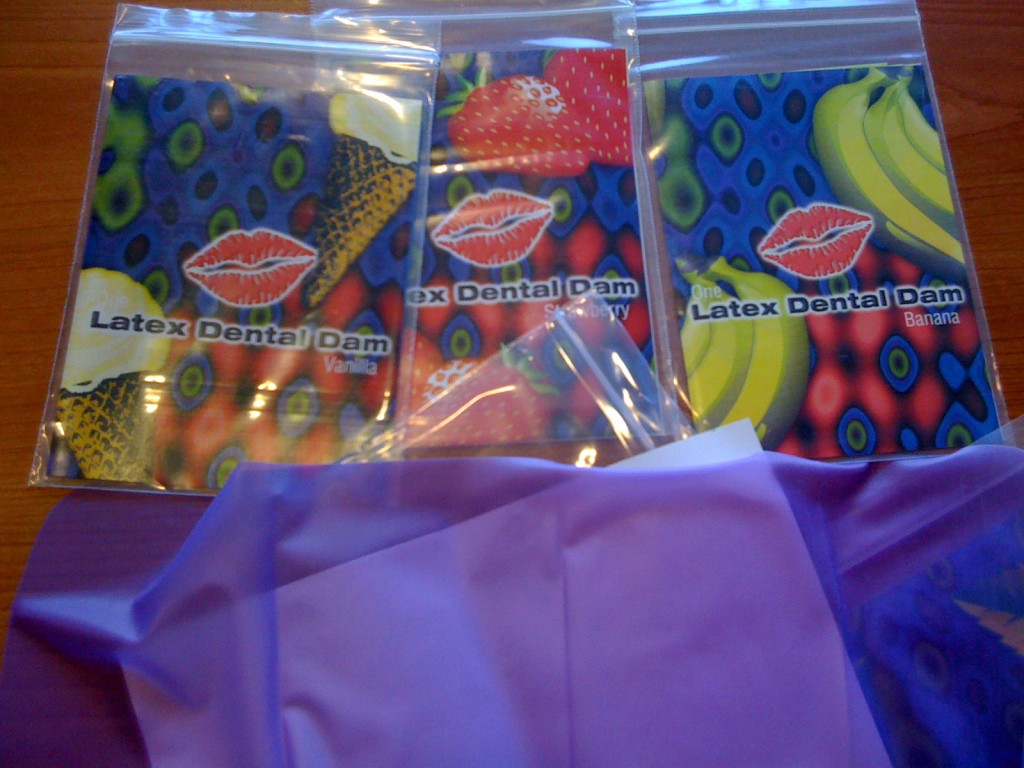Life savers for suckers
By Andrea Arscott, Contributor
What’s sweeter than candy, a whole lot of fun, and a lot like a life saver? You guessed it—a flavoured condom.
Don’t like banana? Stick to vanilla or strawberry. There’s more than one reason to roll with scent-sational latex. Although the risk is low, there is a risk of HIV transmission from having unprotected oral sex. The virus can be passed on through vaginal fluids, semen (including pre-cum), anal fluids, and blood (including menstrual blood). So, lay down some plastic before your partner spills the juice!
You’re probably wondering what kind of plastic shield a guy could use on a girl to protect himself, right? If he can’t get his hands on a dental dam (a rubber sheath the dentist uses to cover your mouth during invasive procedures), he has other options. He can cut the top and bottom off a flavoured or non-lubricated condom to create a little square sheet, or when no one’s looking, he can make a run for the kitchen and steal the non-microwavable cling wrap. I’m not kidding—load up the shopping cart. Make sure it’s non-microwavable though, because the microwavable wrap is more porous, and consequently less safe.
Now that you’ve got your grocery list out, make a note to get tested too. A doctor can test you for HIV through a blood, oral fluid, or urine sample. To determine if you or your partners have any other sexually transmitted infections (STIs), women should schedule regular pap smears, and men should book annual physicals. Being examined increases the probability that doctors will discover STIs like genital herpes, which is caused by the herpes simplex 1 and/or 2 viruses. If there are no signs or sores, you can also request a blood test to see if you’re a carrier. All carriers are able to transmit the virus, even if they don’t have an outbreak. This is why it’s important to use condoms: although herpes can be contracted through any skin-to-skin contact, practising safe sex reduces the likelihood of getting the virus.
Cold sores are the result of the herpes simplex 1 virus and are spread when an infected person swaps spit and shares utensils, drinks, lip balms, and pipes with other people. So, if someone with a cold sore kisses any part of your body, you may develop herpes in that area. Translation: when an infected person performs oral sex on you without a rubber barrier, that person can give you genital herpes. To lessen the chances of herpes transmission, avoid kissing, and don’t engage in vaginal, anal, or oral sex during outbreaks on the lips or genitals. Although there’s no cure, herpes type-1 and -2 are extremely common and manageable with treatment and use of protection.
Whether you want to burn rubber or not, be sure to visit your doctor or a medical, youth, or STI clinic to get tested, and ask your partners to do the same. Specify that you want to be checked for HIV, hepatitis C, and all other STIs, and if you’re concerned about herpes, ask about testing for it.
Flavoured condoms—not to be confused with edible condoms— are sold in most stores or pharmacies. If you eat the condom, it’s no longer protecting you, and then you’ve got a problem.
Stop HIV and hep C now. Play safe. Get tested.
Come down to the Purpose Society clinic at 40 Begbie Street in New West Friday, April 25th for HIV/HCV/STI testing and vaccines from 10 a.m. to 1 p.m. and free condoms! Do you have a sexual question? Get it answered anonymously (and maybe published in this column) by emailing sexyquestions@purposesociety.org


